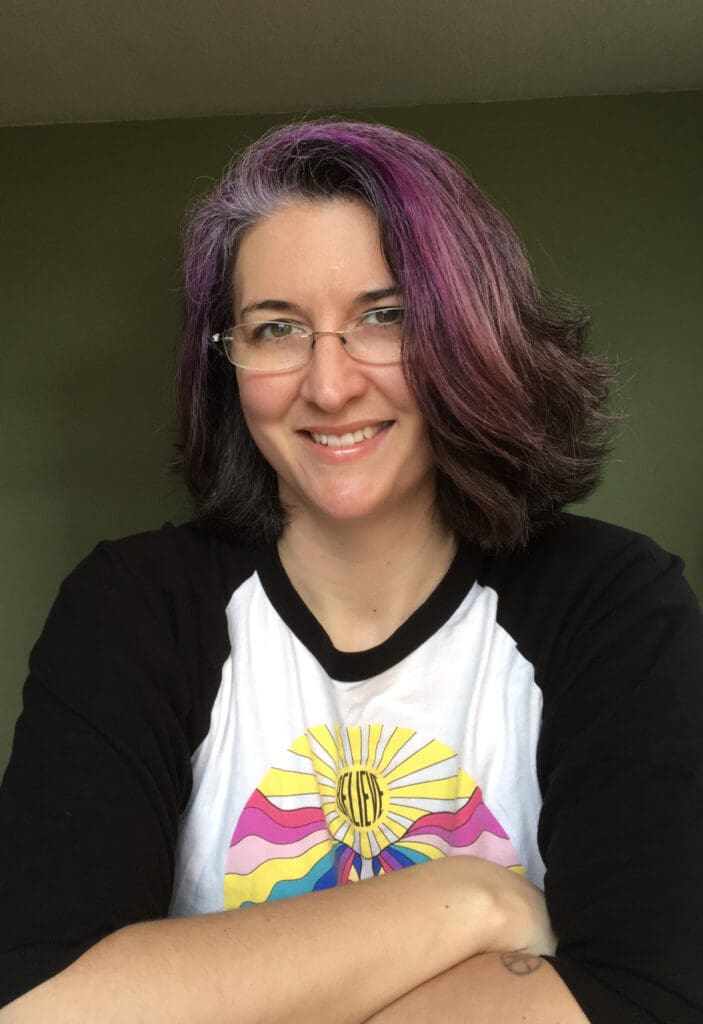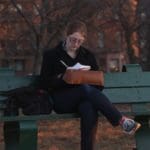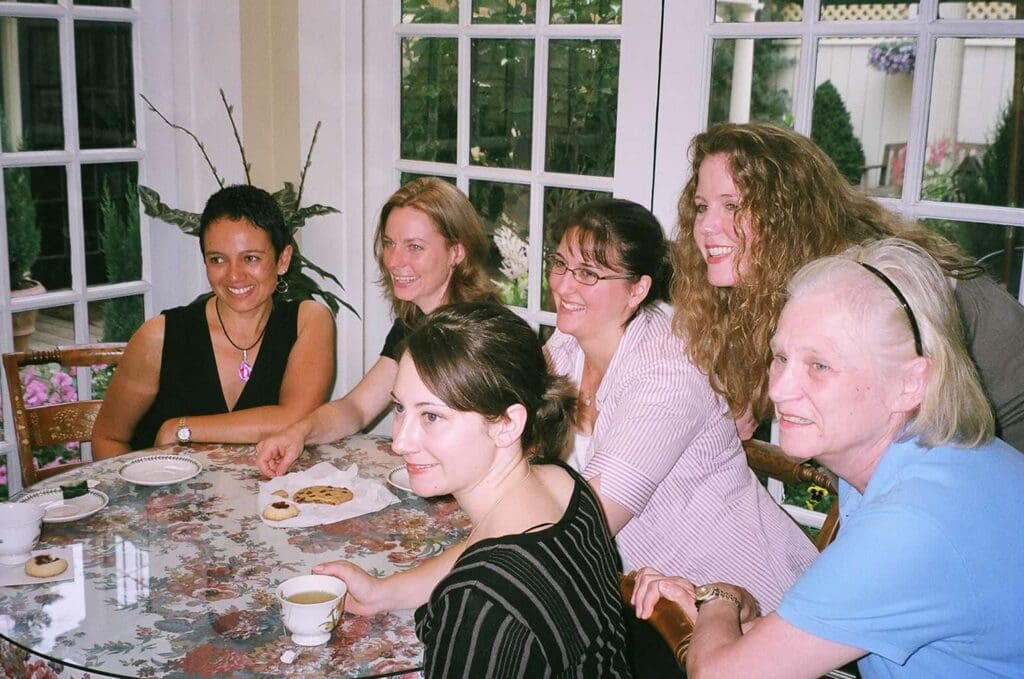In our next interview, poetry alum Kate Kearns talks to us about her early influences, sending out her manuscript to indie presses during the pandemic, and how editing other people’s work has influenced her own writing. Read on to find out more!
KATE KEARNS – POETRY, JUNE 2008

KATE KEARNS is a poet and freelance editor based in Maine. She has published a chapbook called How to Love an Introvert (Finishing Line Press), and while she looks for a home for her first full-length manuscript, poems have appeared in many print and online journals. Kate provides manuscript editing services to authors and poets through her agency, Black Squirrel Workshop.

Interviewed by
Julia Leef
Do you remember the works or influence that first led to your interest in poetry?
Elizabeth Bishop, hands down. She was the first grown-up poet who showed me that poems could be real and impactful, but also aloof and cunning. I always enjoyed reading and memorizing poetry, even when I was in grade school, but reading Bishop caused the shift that made me want to write poems of my own. She’s still my favorite.
I was fortunate to have a poetry workshop offered at my high school, so I learned early about the workshop environment and the practice of revision. It was a revelation that there were poets writing NOW, TODAY, and that being a poet was still a thing. In high school it’s all Shakespeare, Frost and other dead white men who make it seem like poetry belongs to another time. I went into Sarah Lawrence as an undergrad knowing poetry was what I wanted to do, and knowing that it was something I COULD do.
Your first chapbook, How to Love an Introvert, was published in 2015 with Finishing Line Press. How did it feel having your poems out in the world and what was the most unexpected part of that process?
For a person who is allergic to attention, I don’t really mind having poems out in the world. I hadn’t had any individual poems accepted in journals yet when the chapbook was accepted, so it was all unexpected territory. I had no idea how to promote a chapbook, who to approach for readings or reviews, and no audience to invite to a reading even if I did book one. At Lesley we had lots of panels about getting published, but none about what to do once the book is out. Most indie publishers expect you to handle all of that since they don’t have the budget or the staff. No one had a clue who I was, so I’m sure most of the copies were purchased by friends and family.
Now, I have a much longer list of publications and have gotten much better at participating in my local community, so I put a couple of my favorites from the chapbook into my current full-length manuscript so they stand a chance at being read by someone other than my mom.
What techniques have you learned to help you overcome periods of writer’s block or any other challenges you encounter while writing?
Reading. Reading widely about topics that stretch my curiosity keeps my writing eager, and reading poetry makes my creative brain switch on. I don’t really believe in “writer’s block”, I just think there are times when you’re filling up and times when you’re expressing, and both are part of the process. As a parent who works full time, I struggle more with making the time to quiet my brain and let creativity happen.
What changes in your writing became evident after you went through the Lesley MFA program?
I got better at recognizing lines and words that were necessary to get the poem to a certain place but weren’t needed in the final draft—the parts that are self-serving or expository and take the energy out of the poem.
It’s important to remove your own ego and think of the reader outside of your own mind—why do we care about this poem? Is it just saying, “look how clever I am?” or does it have something real to offer?

Your bio mentions you are looking for a home for your first full-length manuscript–what is this manuscript about and can you talk a bit about the process of sending it out?
The manuscript is a collection of (mostly) lyric poems. Are there any poets out there who are good at talking about their books and what they’re about?
Sending it out is an exercise in patience and humility. The pandemic has hit indie presses hard. The cost of printing books is going up, and sales are harder when you can’t do in-person readings and people aren’t browsing at bookstores. So, they’re accepting less work than usual and publishing fewer books while the number of submissions isn’t going down. I’ve read a lot of kind, personal rejections, and yes, some form rejections. Though fewer books are being published, there’s a lot of stellar work out there right now, so when I see the books that are chosen over mine, it’s hard to be too hurt.
Since I’m fortunate enough to be financially stable right now, I’m continuing to research small presses and send my manuscript out, but I’m also buying more books from indie presses when I’d usually get them from the library. My turn will come.
In addition to your writing, you also work as a freelance editor for Black Squirrel Workshop. What led you to editing other authors’ manuscripts and how do you feel it influences your own writing, if at all?
We’re among peers here, so let’s be real. You can’t eat poetry, you can’t live under its roof (on the physical plane), and a higher education also results in life-long student loan debt. Writing and publishing poetry doesn’t earn an income. I like it that way, because my art isn’t tethered to my livelihood, but a girl still has to eat. I started Black Squirrel Workshop so I could work from home when my daughter was little. I could be romantic about it, but the honest answer is, editing other people’s writing used my degree and skills in a way that didn’t drain my own creative energy.
Editing other people’s work, I did cultivate a ruthlessness for deleting fluff and unnecessary exposition in my own writing. Mostly, I’ve made relationships with the writers who trusted me with their work, which is no small thing, and some of those relationships have become friendships.
Recently, I took a full-time communications position with one of my long-time freelance clients, so the editing business is hibernating. It’s my first time using my powers at a for-profit business. It’s mission-driven, owned and operated by people of color and women, and I am unapologetically good at what I do every day.
Are there any projects you’re currently working on?
Working on new poems is a balm when I get frustrated with book rejections, so I’m doing less revising lately and more starting, more exploring. I’m noticing a new shift in my poems these days. They’re more no-nonsense than they used to be, and I’m coming out from behind them more, as a speaker. Maybe I’m just getting older and tolerating less bullshit from myself, or maybe the pandemic has taught us all that there’s no time to dilly dally. Either way, I’m interested in where this new development leads.
Listen to Kate read several of her poems here:


Comments are closed